
What is High Impact Learning with Dan Anderson
This episode is dedicated to the High Impact Learning that is not limited to just the information you are provided within the classrooms. It meant you have to truly learn about something by actually applying what you have acquired in a learning program so that you can deliver the desired results for your organization. The main focus here is to practically implement the course material for better understanding purposes. This can be done by promoting the activity-based learning in the organizations. Then it becomes a true process where you are doing performance-based work rather than just gaining bookish knowledge.
Now how do we achieve high impact learning? It is a three step process that consists of Three A’s. The first phase is Alignment that comes before you are taking part in a learning program. You have to understand that what results are to be achieved from this learning? And how these results are going to impact or benefit the bigger goals that your organization has. For these purposes, a simple tool called learning impact map is used. The best way to ensure this is to interact with the participants and make them understand the main goal behind the learning program the organization is paying for.
Then comes the assimilation phase that mostly consists of the classroom learning. It’s about letting the participants use what they know and practice during the class to build better skills of their own. In the end, the application of the knowledge is required because that is where the 80% of the learning lies in. The participants will be using the skills and knowledge to make their learning stick around for a longer duration. These steps are important because adults learn differently and this encourages them to self-direct themselves to improve themselves.
The participants need to be able to make mistakes and learn on their own. They need to learn about the techniques and the best practices. They need to just go ahead and apply these techniques to check their integrity for themselves. The management should be involved and positive enforcement should be encouraged to get the maximum results out of a training program. They need to be getting satisfaction out of what they are learning. The results should be measurable and the best way to know for sure what they have learned is to assess them before the training program and then after it.
The organizations have very limited resources for training programs and sometimes they are afraid to invest in their employees. But they need to truly understand the long-term value of these training programs. The ROI is definitely one of the major goals of every training program and in order to do so, leadership needs to be more supportive during the application phase. They need to get them coaching by hiring SME’s to help the participants along the way. The follow-through is important too, done by taking action, getting feedback and collaborative learning.
Eruditio Links:
- Eruditio, LLC
- A Smarter Way of Preventative Maintenance – Free eBook
- Maintenance Planning & Scheduling: Planning for Profitability Video Course
Dan Anderson Links:
- Life Cycle Engineering
- LCE Train the Trainer
- SMRP.Org
- SMRP 2017 Annual Conference
- IMC 2017
- Bob Pike Group
- ATD

Rooted In Reliability podcast is a proud member of Reliability.fm network. We encourage you to please rate and review this podcast on iTunes and Stitcher. It ensures the podcast stays relevant and is easy to find by like-minded professionals. It is only with your ratings and reviews that the Rooted In Reliability podcast can continue to grow. Thank you for providing the small but critical support for the Rooted In Reliability podcast!
 Ask a question or send along a comment.
Please login to view and use the contact form.
Ask a question or send along a comment.
Please login to view and use the contact form.
Leave a Reply